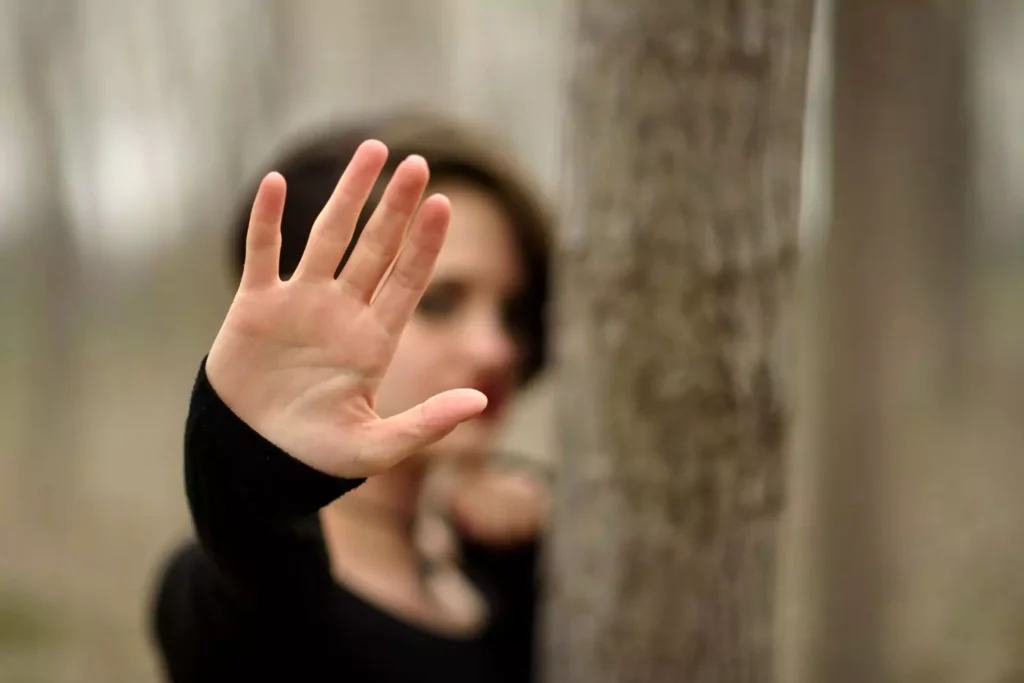I struggle with self-injury.
There, I said it.
It’s out in the world now, and it’s too late to take it back.
I’ve struggled with self-injury for years. Of all the things that I’ve dealt with since becoming a Christian, this is by far the most difficult one to talk about. I had already been talking about having an eating disorder for years before I came to know God, so that really wasn’t difficult for me to talk about. It became more difficult to discuss as I continued to struggle for years, but even with that, the truth would come out eventually, as my friends watched my size grow and shrink and grow and shrink.
I told my Bible study leader soon after I met her about my struggle with same-sex attraction, along with lots of other sordid things I had done or dealt with, because I was sure she would say, “Nice to meet you, but you’re not welcome in my Bible study.” Thankfully, she had the opposite response and I remember those early days in her Bible study very fondly.
About a year after that, she and my closest Christian friends watched me fall into a lesbian relationship. If they didn’t already know about my struggle, they did now. And three months later when I was dumped, they helped me walk out of that disaster.
A few months down the road, one of these godly people had a friend in town. Over dinner one night, she said, “Brenna, will you tell my friend how you came out of lesbianism?” I almost spit out my drink all over the poor guy. This was supposed to be our secret! But in that moment, as I watched her friend’s face light up, knowing that he wasn’t alone, God made it clear that this was something He wanted me to talk about.
Now I’ve spoken in large venues about overcoming same-sex attraction. Personal questions on that topic don’t even faze me.
But self-injury? I’ve always said, “God, please don’t make me talk about self-injury.” So how did I get from that point to now, sitting at my desk, writing this article?
Let me back up a bit. I can clearly remember the first time I self-injured. I was over at a friend’s house, and I called my dad to let him know where I was. He said he had noticed that there was some alcohol missing and he wanted to talk about it when I got home. I had, in fact, taken the alcohol, and I was terrified.
I left my friend’s house to go to bell choir practice. I remember looking for shards of glass on the ground, beer bottle caps, anything that I could cut myself with. I remember, during the rehearsal, going into the Sunday School rooms between songs and trying to cut myself with the dull scissors that kids used during their lessons. I guess I thought if I came home, bloody and bruised, maybe my dad would forget about the alcohol and instead be concerned for my well-being. When I went home that night, nothing was said about the alcohol, and I didn’t show my father the cuts, which were just superficial. I was 14.
After that point, I would cut for all sorts of reasons. I was in a tumultuous relationship with a girl at school that I was trying to hide from everyone, so therefore, I had no one to talk to about it. I was struggling with severe depression and suicidal thoughts. I hated myself for being “fat” in my eyes. So I cut.
Sometimes, I would go in my basement and punch the cement floor with my fists. Once I decided to hit myself in the eye with a meat tenderizer. I must have been really full of rage and self-hatred to do that to myself. Just imagine for a minute trying to hit yourself in the face with a hammer, and you’ll get my point.
The cutting and hitting continued throughout high school. My girlfriend knew, but few others did. One time, I pushed up my sleeves to play the piano, and my sister saw the scars. She asked me what happened, and I said I cut myself. She didn’t say anything else. I decided I needed to be more careful after that and began to cut in less noticeable places. Occasionally, a doctor would see the scars and ask me if I cut myself. I always responded honestly, almost as if I wanted someone to offer me help, but there was never any follow-up.
I don’t really know why I self-injured. I mean, I remember why I did the first time, but I don’t know exactly why I continued. I think it started off as a way to handle all the emotional pain I was going through. As strange as it sounds, cutting myself, in the beginning, redirected my focus. The physical pain was more immediate, more present than the emotional pain. This only worked for so long, and then self-injury just became a habit, a very inadequate way of processing my emotions. Hitting came later.
Quite honestly, I grew tired of the questions that came with the scars from cutting, so I decided I needed to do something less visible. Later, when I decided cutting was just too neurotic and I wouldn’t allow myself to do it anymore, I would hit as a release. I found myself punching a wall when I felt as if my voice weren’t being heard in a situation, or I wasn’t being listened to or understood. Anger, an emotion that I bottled up for years, would also come out in hitting when I allowed it to go unexpressed for too long.
There were periods of time when I wouldn’t cut, or even hit. I wasn’t always sure what made the difference. During one such period, my girlfriend I was living with threatened to break up with me or kick me out if I continued to self-injure.
After I became a Christian, I tried so hard not to self-injure. Every time I slipped up, I would become really depressed and down on myself. Even as I overcame some of my other struggles (same-sex attraction, an eating disorder, depression and anxiety), self-injury just seemed to linger.
For many years, I didn’t share with anyone, besides my counselor, that this was still a struggle. I was too ashamed that I had not yet overcome what I viewed as a simple lack of self-control. For this reason it seemed impossible to me to accept God’s grace into this area of my life. I felt I should have just been able to stop.
Then, I was in a situation where I was presented with a ministry opportunity. In applying for this opportunity, I had to write about any sin struggles and what place I was in, in terms of overcoming them. And I was honest. During the interview, my struggle was not mentioned and at the end, I was approved to work with this ministry.
I was so taken aback that I asked the interviewer if she had read in my questionnaire about my struggle with self-injury and if that would be an issue or a block for me to do ministry. And she said as long as I wasn’t cutting, she didn’t see it as an issue. I was in counseling and clearly working on it, and that was enough for her. I had also recently told my pastor about my struggle, as I was serving in the church. He didn’t see it as an issue either, as long as I was honest and had accountability.
Self-injury was the one struggle, of all my struggles, that really made me feel as if I must be crazy and thus somehow disqualified me to serve Christ. For a long time, the enemy really magnified that feeling in me, which perpetuated the shame and further kept me trapped in the cycle of sin. When someone extended to me the grace that I was unable to extend myself, it was as if the darkness and the guilt that kept me stuck was somehow lifted and I really didn’t want to even do it anymore. Since then, I can count on my fingers how many times I’ve struggled. And I’m so thankful for that.
This is not the first time that I’ve mentioned my struggle with self-injury in a public forum, but this is the first time I’ve actually discussed it in depth and not just mentioned it in passing. I can’t present you with any real answers as to why I and so many others struggle with this issue, or even any solutions as to how to overcome it. If you’re struggling, just know you’re not alone. And you don’t need to be ashamed. I pray that you find the strength to reach out, let your voice be heard, and get the help that you need to overcome.
* * *
Focus on the Family has a staff of licensed Christian counselors available to talk with you. If you are struggling with cutting or depression and would like to talk with one of them, please call 1-855-771-HELP (4357) Monday through Friday between 6:00 a.m. and 8:00 p.m. Mountain time.
Copyright 2008 Brenna Kate Simonds. All rights reserved.











